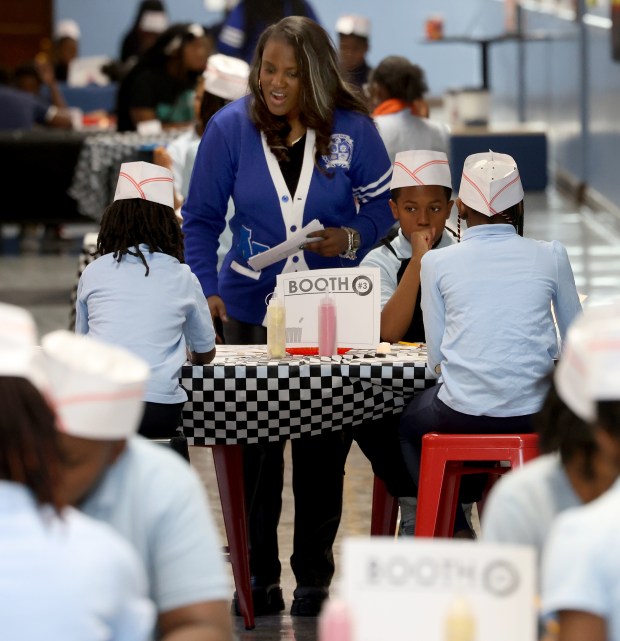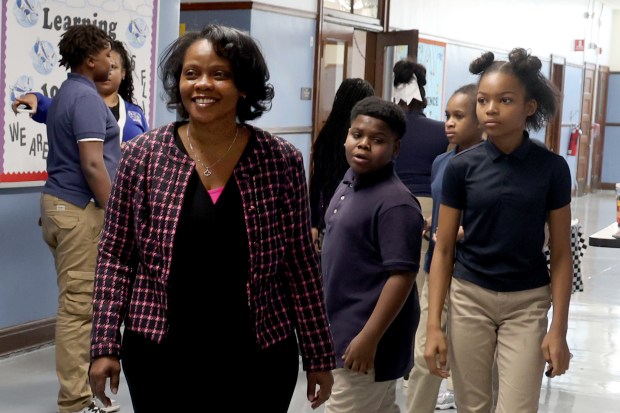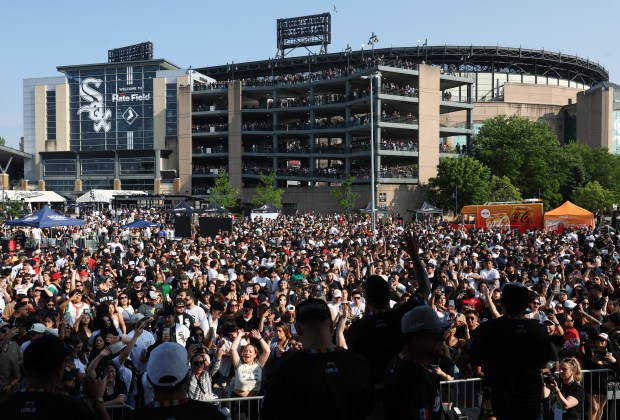Walking up the stairs to the second floor of Avalon Park Fine & Performing Arts School, a row of tables transforms the hallway into Ms. Leachman’s Diner and farther down the hall Ms. Strahan’s Food Court.
Huddled around gingham-clothed tables and reorganized couches meant to resemble restaurant booths, students begin working out the totals of their imaginary customer’s orders.
Learning about percentages and ratios, the imaginary restaurants named after the fifth-grade and sixth-grade teachers provide students with a more interactive way to put what they’ve learned from their math unit into practice. One way the school has begun transitioning to implementing a “personalized learning model.”
Avalon Park is among four Chicago magnet schools that have received a $15 million grant over five years to implement this model, allowing students to create their own learning paths, explicitly tailored for them. The instructional model allows students to work with teachers to co-design their learning path, pace and environment based on their strengths, needs and interests.
Awarded by the United States Department of Education through the Magnet Schools Assistance Program (MSAP) grant. This funding will support the full implementation of personalized learning and will take effect in the 2025-26 school year and continue through 2028-29.
“The District is constantly innovating and exploring instructional models to help students learn in ways that work best for their strengths and needs,” CEO Pedro Martinez said in a news release. “The implementation of personalized learning at these four excellent schools is another example of ongoing efforts to remove barriers to a high-quality education that meets the needs of our diverse student population and meets individual student needs to maximize their potential.”
The four schools selected for the grant – Avalon Park Elementary School, Milton Brunson Math & Science Specialty Elementary School, Rudyard Kipling Elementary School and Logan Square Elementary School, will be joining 13 other personalized learning schools in the district.
While Avalon Park will begin fully implementing personalized learning in the fall, the transition to the model began two years ago when students were sent a survey about their learning experience. The one thing they wanted: to have fun while learning.
That’s exactly what Principal Takeshi James and her staff of educators set out to do.
The transformation of the second-floor hallway has become customary at Avalon Park, with teachers designing “hallway bursts” to test students’ learning every couple of weeks. Previously turned into Candy Land and even the continent of Africa, Principal James said students “never get the same thing twice.”
“It’s going to be a new wave for Avalon Park,” Principal Takeshi James said. “By diving deeper into personalized instruction, we are going to be able to enhance student engagement, provide real-time feedback, and foster an environment where students feel supported and challenged based on their individual learning profiles.”
The new grant will allow educators at Avalon Park to build on their existing instruction, focusing on tailored, individualized instruction. At a school with a 28% mobility rate and predominantly students of color, James said she hopes the grant and continued implementation of personalized learning will allow students to “dream bigger” and open more opportunities for students in the coming years.
“[I want] to be able to give them vast opportunities and exposure [that] allows them to dream bigger,” James said. “I want them to know that they can do anything that anyone else can do, regardless of their skin.”

One of thirteen fully-implemented personalized learning schools in the district, Jonathan Burr Elementary School has seen significant improvement in student achievement over the last eight years since they’ve fully implemented personalized learning.
When they first began applying the model in 2017, Principal Amy Klimowski said she wanted to make sure they would be engaging and innovative practices at the school. In the beginning, it was a “messy process” as educators began to change and design their learning environment.
However, once the school began partnerships with outside organizations and CPS’ Department of Personalized Learning, that’s when they were able to find their footing. By 2023, Jonathan Burr Elementary School had become a personalized learning model school and had witnessed incredible improvement from students.
“We saw a lot of changes immediately,” Sarah Crawford, Burr’s Personalized Learning Coordinator, said. “With the flexible seating changes and going from more of a traditional environment into one that highlighted and respected kids’ choice and autonomy, kids responded well to that.”
Students’ test scores have begun to reflect that. Students’ English Language Arts proficiency has increased by almost 33% since 2022, about 40% better than the district and about 30% better than the state, according to the Illinois Report Card.
“We are far exceeding the district and the state in reading, math and science on the [Illinois Report Card],” Klimowski said. “We also are working on closing the opportunity gap with our students because we are giving our students voice and choice in the way that they are learning and showing mastery of the standards.”
To fifth-grader Geffen Epstein, personalized learning means being able to go at his own pace and “taking [his] own baby steps… to get to a higher level.” Through personalized learning, Epstein said he’s been able to figure out that he learns best on his own and it’s made him “a lot more successful being able to choose [his] own path.”
“A lot of people are stressed out about grades, but it makes me not think about grades and just think about what I’m learning and what would help me learn better,” Epstein said.
By being able to choose the way he’d like to learn each day, Epstein said personalized learning has given him a balance between being able to talk with his friends and “having to be serious” when focusing on learning.
Having this balance and being able to learn in a way that works best for him and at his own pace has made Epstein excited to go to school every day.
“Coming to school every day when you know that you’re either going to be happy because you can move around the room… or coming to school [knowing] you can get personal help is very helpful,” Epstein said. “It really feels like you’re learning and it’s more based on yourself, so you can take your own steps and grow at your own pace.”




